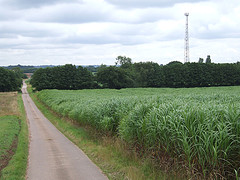 In the constant push for ever newer and greener technology and energy, we sometimes forget that it is often both simpler and cheaper to revisit old techniques in new ways. And that’s exactly what a group of researchers in California has done.
In the constant push for ever newer and greener technology and energy, we sometimes forget that it is often both simpler and cheaper to revisit old techniques in new ways. And that’s exactly what a group of researchers in California has done.
By combining several old and well understood chemical techniques and reactions, they have discovered how to easily remove oxygen from biomass. No doubt, that sounds extremely boring unless you work in the chemical industry yourself, but the implications are staggering.
 Today, just about every piece of plastic we use is derived from petrochemicals — which means every time we buy a gallon of milk or a new bottle of shampoo, we’re slowly depleting the planet’s finite fossil fuel supply and adding just that tiny bit more to the greenhouse gases in the atmosphere. Instead, imagine that we could make all our bottles from biomass — a renewable resource that, under the right conditions, is entirely carbon neutral. No longer would the plastics industry have to rely on ever decreasing oil supplies from fewer and fewer sources around the globe. Biomass, which is just a technical term for a heap of generic plant matter, can simply be grown.
Today, just about every piece of plastic we use is derived from petrochemicals — which means every time we buy a gallon of milk or a new bottle of shampoo, we’re slowly depleting the planet’s finite fossil fuel supply and adding just that tiny bit more to the greenhouse gases in the atmosphere. Instead, imagine that we could make all our bottles from biomass — a renewable resource that, under the right conditions, is entirely carbon neutral. No longer would the plastics industry have to rely on ever decreasing oil supplies from fewer and fewer sources around the globe. Biomass, which is just a technical term for a heap of generic plant matter, can simply be grown.
Recently, biomass has been hailed as the newest and best source of biodiesel, but its production creates several byproducts, including the unwanted chemical glycerol. (While there are some uses for glycerol, the production of biodiesel has created a glut on the market, producing far greater supplies than necessary to meet current demands.) The new reaction worked out by a team of researchers from the U.S. DOE’s Lawrence Berkeley National Laboratory and the University of California at Berkeley reacts this wasted product with formic acid, a common chemical in nature found in bee venom and produced as a byproduct in the manufacture of several other industrial chemicals. By isolating the reaction from air and instead reacting it under nitrogen, this old reaction now produces large quantities of allyl alcohol — which chemical manufacturers use as the starting point for making any number of polymers, drugs, herbicides, pesticides, and other chemical products, including common, household plastics. Currently, these same manufacturers must produce allyl alcohol by instead oxygenating petroleum.
So far, the researchers involved have only performed this new procedure in their own labs, and they predict that scaling the reaction up to industrial levels will take concerted effort on the part of both academic and industry researchers. But even discounting the vast benefits for the environment, given the cost of oil compared to the cost of biomass, the financial windfall for the chemical industry could be enormous.
Photo Credits: nationalrural and octal at flickr

